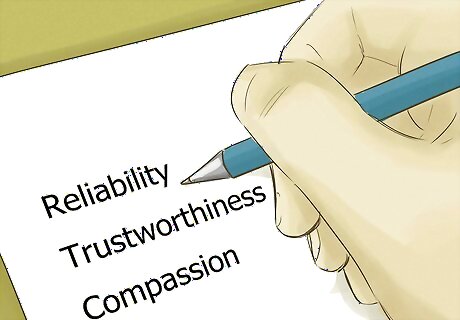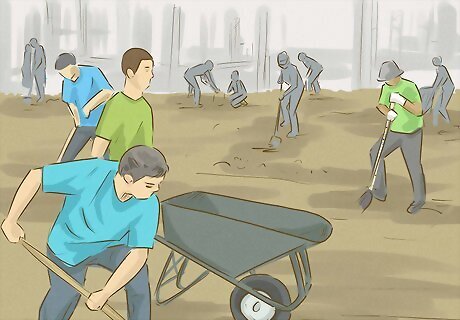
views
Improving Your Outlook

Be nice and kind to everyone around you. Believe it or not, this can be the first step to feeling your own power. If you don't see yourself as worthy or good enough, you might not recognize the effect you can have on others. Truth is, no matter who you are, you have the power to positively (or negatively) impact the world. Your lousy mood can be contagious; however, happiness and positivity are, too. Research shows that doing something kind for someone else increases the 'feel-good' chemical in our brains, known as serotonin. So, even when you're not feeling too great, try to be nice to others - you'll feel better in the process. Take a moment to make eye contact. Ask others how they're doing or offer a sincere compliment. Try to remember names and ask friends or coworkers about their loved ones. Give people the benefit of the doubt. You don't know what's happening in their lives. You might be the one and only person to treat them like a human being today. You may not realize how just one kind word or smile - even from a stranger - can lift someone's spirit.

Fake it until you make it. Going through the motions of feeling happy and content can actually lead to contentment. Just as doing something kind for others can make us feel better about ourselves, pretending that we are in a great mood can, too. If you wake up one morning feeling particularly low, try to stop the cycle by channeling positive energy. Look in the mirror and smile at yourself. It may feel silly, but it works. When you go out into the world and others ask you how you're doing, answer as if it's the best day of your life. Say things like "I'm having a marvelous day" or "The day just keeps getting better and better." Projecting happiness can result in a self-fulfilling prophecy. After you've spent an hour or so smiling and commenting on how great a day you're having, you'll eventually find that you really are having a good day. In fact, research shows that just faking a smile and arranging your facial expression in this way can invoke some of the same autonomic changes that a genuine smile can deliver. For example, holding a pencil in your teeth activates the smile muscles, and, in time, you will find that you are feeling calmer and more happy.

Learn to value deeper virtues. Sometimes you may undervalue all the good things in your life because you are focusing on superficial possessions like a car, your looks, or your house. Superficial things can be fleeting. Fortunes can be lost. Nonetheless, some traits like love, honor, integrity, and honesty are enduring. Learn to appreciate natural beauty, good character, true friendship and your family. Develop a list of positive adjectives that describe yourself and the people around you. Reliability, trustworthiness, compassion. All of these are terrific traits that may go overlooked. Identify what you value in yourself and other people, and then make an effort to notice when these traits are being displayed in yourself and in others. Try to compliment others on their values rather than their looks or possessions (you can still do this but also include some value-based compliments). Say to a friend, "I really appreciate how I can always depend on you to be honest with me. Even when your opinion differs from mine, I can count on you to be straightforward. Thanks."

Change your self-talk. How you're feeling about yourself and your life may come down to what you're telling yourself in your head. Your self-talk can make or break you. Positive self-talk brings confidence, increased self-efficacy, and a greater mood. Negative self-talk, on the contrary, results in a vicious cycle of depression, anxiety, and poor self-esteem. Follow these strategies to transform your self-talk: Avoid all-or-nothing thinking, like that you need to change your whole life—instead, think about one or two specific areas of your life where you feel the most dissatisfied. Then, think about whether there's anything you can do to improve those areas. Be conscious of your thoughts. Ask yourself whether they make you feel better or worse? When you identify a negative thought, work to change it into a more positive statement. For example, consider these thoughts: "I am worthless. I will never find a job I like." They are clearly negative and block future growth and opportunities. Alter such statements into more positive, hopeful thoughts like: "I have many talents and gifts. I must find a job or past-time that enables me to further develop my talents." Talk to yourself how you would talk to a dear friend. You would not belittle or criticize a dear friend. You would show this person compassion and recall positive characteristics the person is discounting. Show yourself the same compassion.
Learning Not to Compare Yourself to Others

Reflect on your positive attributes. When you compare your life to that of others, you downplay your own accomplishments. Comparison is the thief of joy. And, you will never feel like your life is amazing, if the standard you are measuring your own success by is that of someone else's. There will always be someone else who is smarter, faster, or richer. Still, there is only one you. Take a moment to recognize all the wonderful things you bring to the table. After considering some of your strengths, write them down on little pieces of paper. Tape a few to the mirror so that you can see them as you get ready each morning. Put one in your wallet and in your car's sun visor. Think of these as little reminders of all you have to offer. If you find it difficult to identify your strengths, do a self-exploration activity to uncover them. Grab a pen and paper and reflect for a few minutes on a good experience that has happened in your life. Think about how you handled this experience and how your excellence was demonstrated. Consider which activities and projects you enjoy doing most. These are those that portray your strengths.

Stop glorifying celebrities. When you compare yourself to other people and their lifestyles, it is very easy to get caught up in thinking they have it better than you. First, it's unrealistic to compare your life to another person's, and second, you have no idea what their lives are really like beyond the glitz and glam. Outward appearances can mask an incredible amount of pain, debt, sorrow, anger, frustration, loss, boredom and who knows what else. Don't believe the hype. Famous people are still people.

Recognize that all humans are flawed. As described above, all people have both desirable and undesirable traits. When you find yourself dwelling on your own flaws, but overestimating everyone else's strengths, you need to stop and perform a reality check. Examine your self-talk and listen closely to what you are telling yourself. Challenge irrational or negative thoughts like "Everyone seems to have nice clothes but me." If you look around yourself, you are certain to find an exception to such a statement.

Enrich your life. One reason you may not feel good about your life is because you are not putting all of your skills and talents to use. Find ways to be purposeful in your life. For instance, if you enjoy creating music, offer to perform for a religious or nonprofit organization. On the contrary, you might feel dissatisfied with life because you are not being challenged. Think about ways you can kick your life up a notch, whether that is by learning a new language, picking up a new hobby, or teaching others skills you've already mastered. In addition to challenging you, hobbies help you to strengthen social bonds and enhance your self-esteem and self-efficacy. EXPERT TIP William Gardner, PsyD William Gardner, PsyD Clinical Psychologist William Gardner, Psy.D. is a Clinical Psychologist in private practice located in San Francisco, CA’s financial district. With over 10 years of clinical experience, Dr. Gardner provides individually tailored psychotherapy for adults using cognitive behavioral techniques, to reduce symptoms and improve overall functioning. Dr. Gardner earned his PsyD from Stanford University in 2009, specializing in evidence-based practices. He then completed a post-doc fellowship at Kaiser Permanente. William Gardner, PsyD William Gardner, PsyD Clinical Psychologist Assess passions, jobs, and relationships to spark purpose when life feels stagnant. It's important to differentiate between a comforting routine and a stagnant rut when life seems pointless. Exploring personal passions, hobbies, or community engagement can spark purpose. Also, evaluate job fulfillment and relationships, as these greatly impact fulfillment.
Developing Gratitude

Cultivate a grateful heart. Gratitude is the one thing that most people who feel a low sense of self-worth lack. If you can look outside your own world, and see how good you really have it, you will feel much more like your life is worthwhile. If you don't have a terminal illness, have had something to eat today, and have a bed to sleep in tonight, materially speaking, you have it better than 70% of all the people in the whole world. Start a gratitude journal or download an app on your smart phone to regularly record all the things you are thankful for. Do this regularly to start seeing all the positives in your life.

Notice small, yet meaningful moments in your life. Think back on times when you felt truly alive and meaningful. Maybe you were there to support a friend going through a hard time, or maybe you made someone else feel special and loved. Recall the feelings you experienced during these moments. Notice that you have significant things happening in your life on a regular basis that point to your value.

Realize that being a part of your family is important. You may not have family, in this case, you must cherish the relationships you have with close friends. If you have children, a spouse, parents, siblings, or best friends you are highly fortunate. Scientists have discovered that those without rich social relationships have a 50 percent higher likelihood of premature death. Since maintaining healthy relationships with family and friends is integral to your long-term health, do what you can to strengthen these connections. Let friends and family know you appreciate them and the roles they play in your life.

Help others. There is nothing that will make you feel like you are valued, needed, and essential like volunteering to help and serve others who are less fortunate than you. Help the elderly, coach at an after-school children's center, feed the homeless, help build a home for someone (Habitat for Humanity), or collect toys for orphanages at Christmas time. Volunteering allows you to: reduce stress, exercise your usefulness, strengthen your immune system, and make a difference in your community.














Comments
0 comment